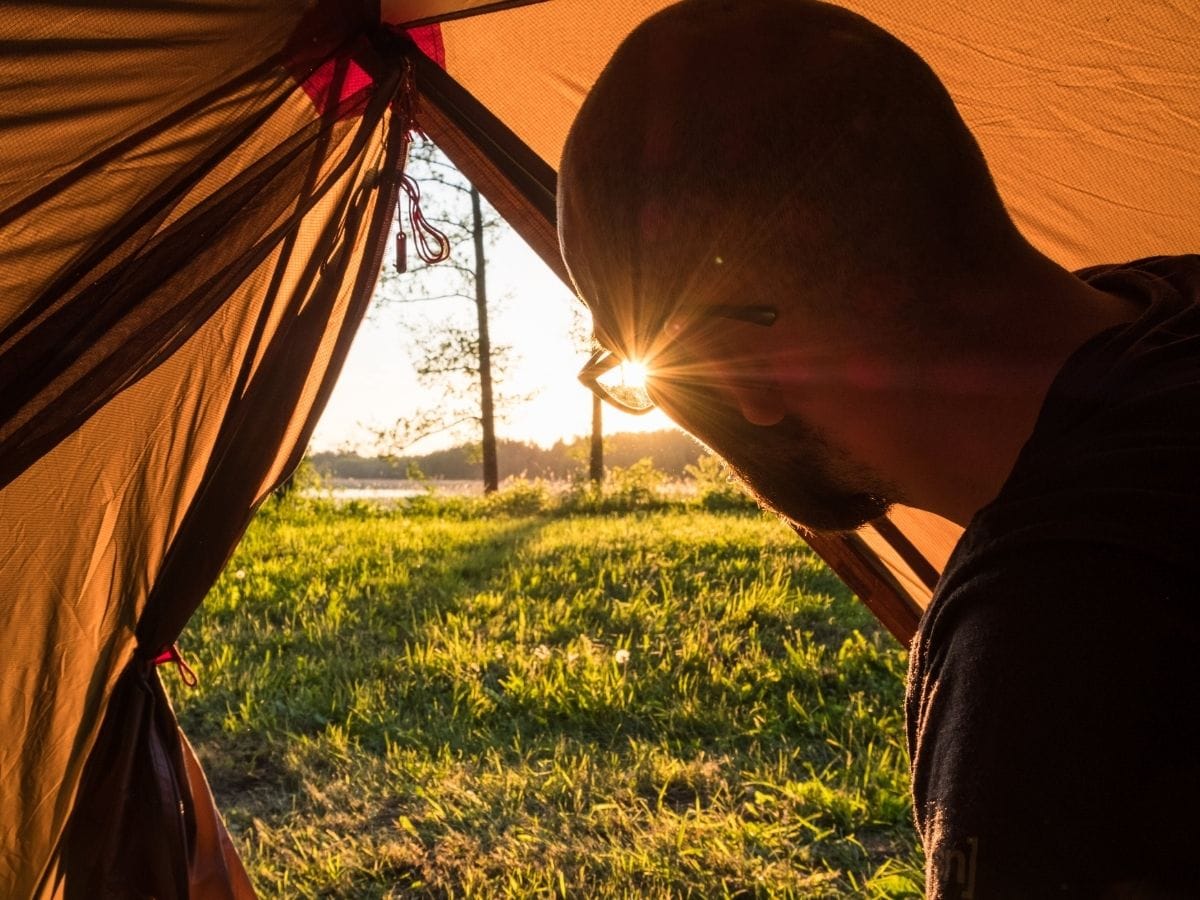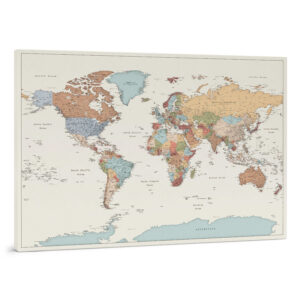For some, camping in nature is a very pleasant, relaxing, and emotionally fulfilling activity. For others, it might look like a total nightmare, leaving nothing but memories of mosquito bites, sleepless nights in a tent, and sore feet behind.
There is one simple thing that will make your first time camping experience comfortable – and that’s proper preparation. To get some useful advice on camping, we decided to talk to some real experts, outdoor enthusiasts, Lithuanian travel bloggers Dalius and Egle.
The active couple spends most of their free time outdoors, trying out different activities: hiking, biking, kayaking, camping, photographing, meditating, or just lying in a hammock under a tree and reading books. They also share their experiences and tips in their travel blog Visur Namai (in Lithuanian), Instagram, and Facebook accounts.
“Every getaway to nature is like a small adventure or a mini vacation. You might need to do some preparation and planning, but in return, you get a bunch of good emotions, peace of mind, new experiences, and inspiration. A lot of times, after a weekend outdoors we come back home physically tired but on the emotional level, very relaxed, full of energy for new tasks and the upcoming week.“
– says the duo.
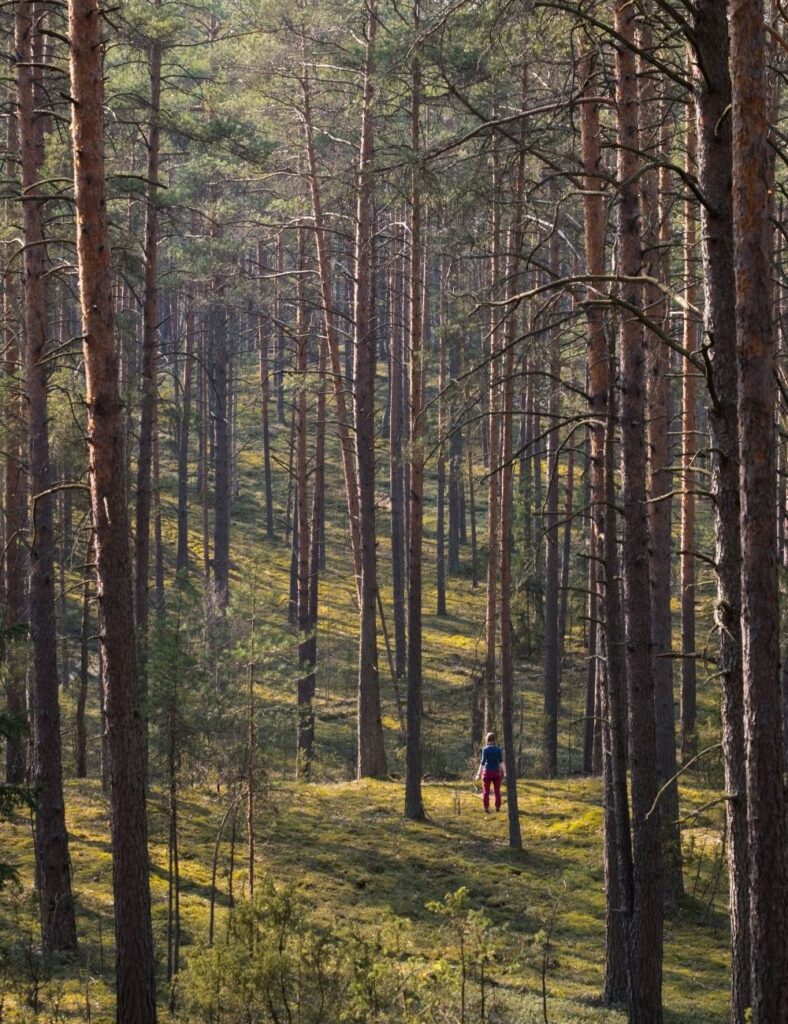
How to start spending more time outdoors?
Camping or any other outdoor activity has a lot of advantages. It’s an opportunity to escape your daily routine, rest, and spend some quality time with your partner, friends, family, or simply alone. A short getaway to nature can be organized fairly spontaneously, and it doesn’t cost much.
Are you one of those people that would like to spend more time outdoors but don’t know where to start? Dalius and Egle suggest to first think about what exactly attracts you to nature and what kind of activities would be interesting for you.
“If you don’t know where to start, don’t be afraid to try out different things – only then you’ll be able to understand what you really like, what makes you relax and enjoy your time outdoors.”
– claims the active couple.
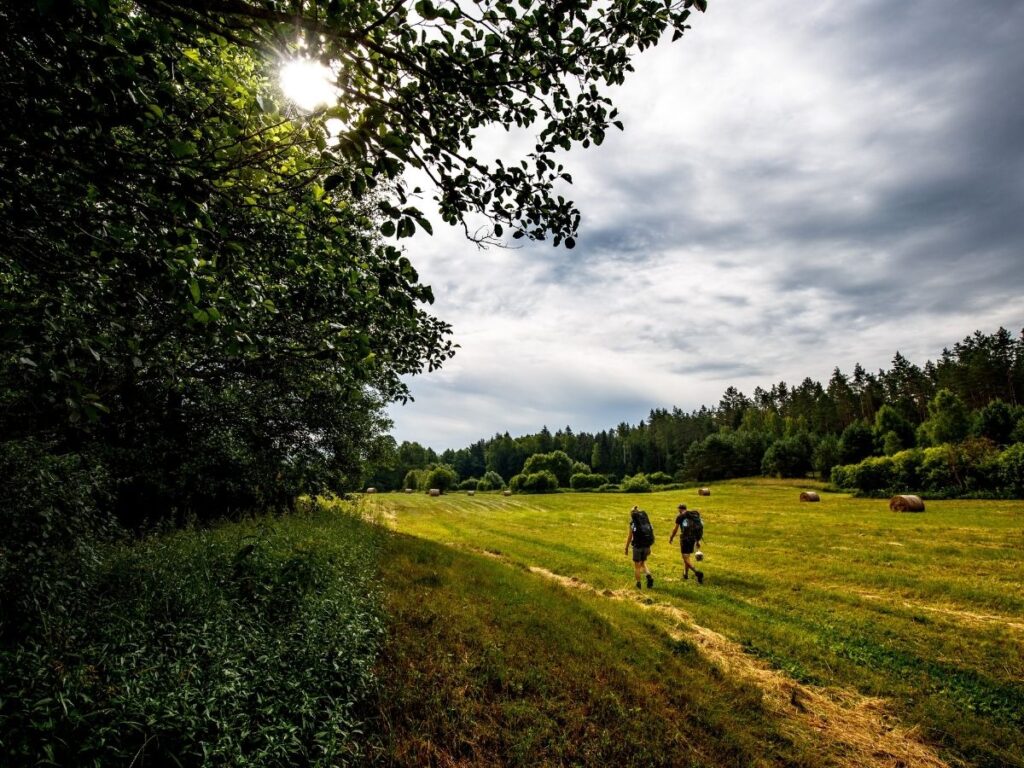
Here are a few of their suggestions on where to start:
- Easy walks in nature. If you like scenic landscapes, and just want to enjoy the views, start with easy walks or hikes in nature. Depending on the country, you can find various hiking trails in the national and regional parks or simply go for a walk in a forest, countryside, or a beach. Such activity doesn’t require special gear or preparation, so it’s suitable for anyone.
- Long hikes with backpacks and tents. In such a case, you’ll be mostly hiking in the wild. Those who want to try it out, need to do some preparation: get some special clothing and gear, pack some supplies, plan out the route or use a map.
- Cycling trips. Those who like to be more active should try out cycling trips. Start by looking up information on how to prepare your bike for a longer trip, what are the best routes, maybe join some cyclists’ community.
- Tent camping. If you’re looking for some relaxing time outdoors, camping next to a beautiful lake over a weekend is definitely a good option. You can also hang a hammock, take some books, board games, a Frisbee, or your camera – anything that will make you enjoy your time in nature.
Useful information on outdoor activities, routes, and first time camping tips can be easily found online, on various websites, blogs, apps, or social media. One of the useful resources that Dalius and Egle are using is the Outside blog. This website is full of useful tips on traveling, cool camping ideas, as well as answers specific questions on gear, clothing, preparation, etc.
How to choose a place for first time camping?
Camping can be very different, so first of all, you should think about your expectations. Do you need at least some minimal facilities in your camping site? Are you willing to pay for a camping spot, or are you looking for a somewhat wild-nature experience?
Different countries have different regulations on camping, so you should always check specific information on where you can build a tent. In most countries, you can only camp in designated campsites. Lots of useful information on camping in different countries and specific campsites can be found on the Cool Camping website. For camping in the USA, you can check out HipCamp.
Our traveling couple, Dalius and Egle, says that most campsites can be divided into two broad categories:
- Paid campsites. Going camping for the first time, you can choose a paid campsite. Such campsites usually have some infrastructure and basic facilities, such as running water, a possibility to take a shower, wash your dishes, etc. Paid campsites provide more comfort and safety, you can also easily meet other campers there.
- Free campsites. For those who want to feel more freedom, and experience wild nature, free campsites are the best option. Free official campsites are usually marked, and you should always check if camping is allowed in specific places. Free campsites won’t provide you with the same comfort as paid ones, though some of them are equipped with a fireplace, some may have benches/tables, a shed from the rain, etc.
It might look like the camping possibilities are endless. However, sometimes finding a good spot can be challenging, especially in the high season or in popular touristic locations. What should you do if all proper campsites are taken?
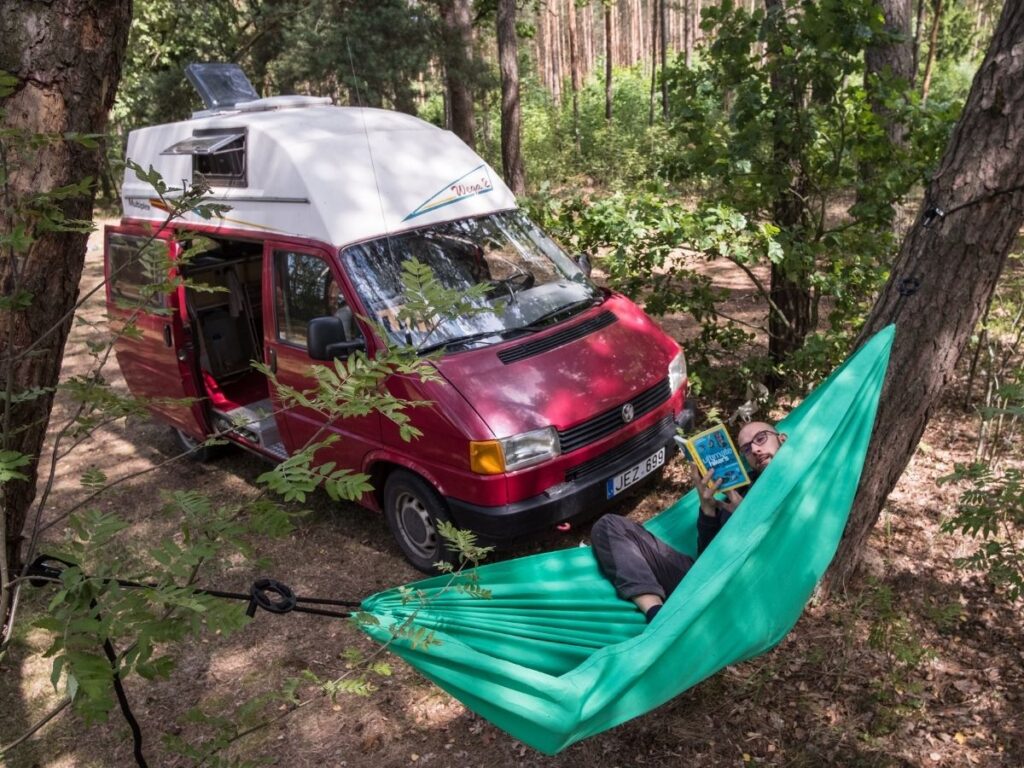
Sharing their experience, Dalius and Egle say that finding a camping spot is much easier when you travel lightly:
“Usually, the campsites that are closer to the lakes or rivers and those closer to the parking lots are taken first – because you don’t have to walk far from your car to bring your stuff. If you take fewer things with you, you’ll be able to move more freely, walk further from your car and find a better place. Also, having fewer things, you’ll need less space in general to camp, so you’ll have more opportunities to find such a space.”
The traveling couple also has another trick. When spending time outdoors, they always mark on their smartphones the unexpectedly found, more remote camping spots, the ones that are harder to reach by car:
“[…] when preparing to camp in the high season, we always check our list of less popular campsites and try to choose something from there – usually we are successful.”
First time camping essentials: gear, clothing, and food
As was already mentioned in the beginning, proper preparation is the key to successful first time camping.
“A tent, a sleeping bag, and clothing are often those essential items that will form one’s opinion about spending time outdoors. If you choose low-quality gear, for example, your tent is not waterproof, your sleeping bag is too cold, or your clothes are not comfortable, it will create an image that camping is something unpleasant and inconvenient. In such a case, you simply won’t be able to relax and enjoy nature.”
– says Dalius and Egle.
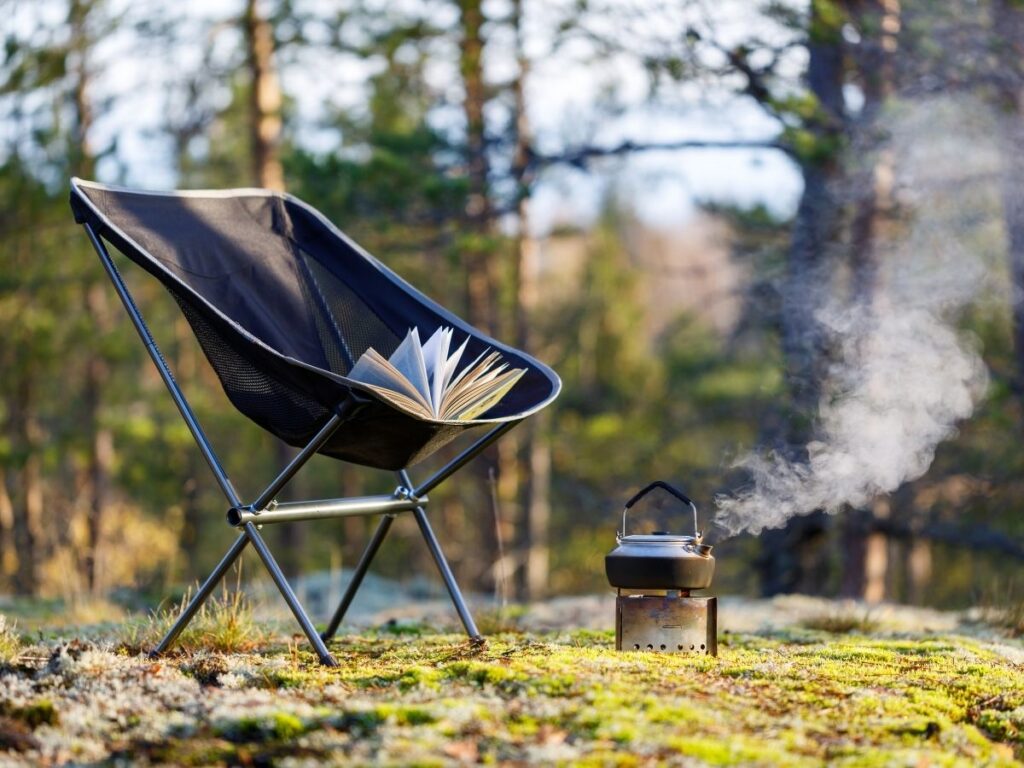
To prevent unpleasant experiences outdoors, you should always have such crucial items as anti-bug spray or sunscreen with you. And what are the other first time camping essentials?
The outdoor-enthusiasts list these basic categories:
- Items for sleeping. A tent, a sleeping bag, and a sleeping pad are the three essentials. Your tent should be chosen according to the way you’re traveling; the sleeping pad can either be a sleeping mattress or a simple roll-up one; the sleeping bag should be appropriate to the temperature you’ll be sleeping in.
- Clothing and shoes. These should be chosen according to the weather in which you plan on camping. In a cooler climate or when sleeping during cold nights, merino wool thermal clothing is a good option. When rain is a possibility, it’s always good to have a proper rain jacket or even rain pants.
- Food and water. For cooking, you’ll need a pot, a knife, a spoon, some matches, a camp stove (or you can cook your food straight on the fire), and of course, your chosen food. It is extremely important to take enough water, and check in advance if there’ll be a possibility for water refills. In the summertime, at least 2 liters of water are needed per person only for drinking, and you should have extra water for cooking and washing dishes.
We also asked the traveling duo some other important questions, that are often raised when going camping for the first time.
How to choose a tent for camping?
When preparing for first time camping, choosing a tent is a topic that raises a lot of questions. Dalius and Egle claim that they usually choose tents of well-known manufacturers, always check reviews before buying, make sure that the product will be long-lasting, and has a warranty.
According to them, the tent must be of good quality and waterproof. It is also important to think about the type of camping you’re planning to do:
“If we’re going camping by car, and we know that we’ll be sleeping in a proper campsite, we usually take a triple tent. That way we have more space and can sleep more comfortably. On the other hand, if we’re going hiking and we know we’ll be carrying our backpacks for a longer time – we choose a smaller tent that is also lighter and more compact.”
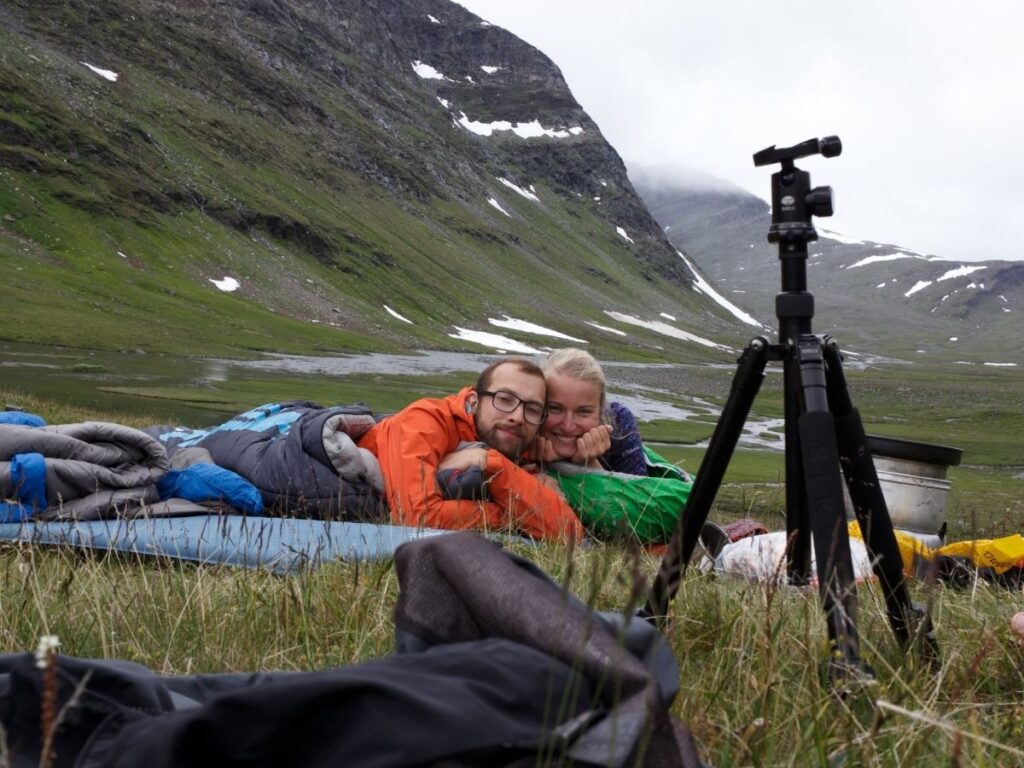
Do I need special camping clothes or shoes?
Even though special clothing and shoes are not vital for camping, they will provide you with comfort, help you relax, and enjoy yourself:
“Camping or spending time outdoors can be compared with sports: you can definitely exercise wearing jeans and simple leisure shoes but it won’t be comfortable or give you pleasure.”
– says the traveling couple.
Good-quality hiking shoes probably have the biggest impact on comfort: wearing them, you can easily hike through rain, wet grass, or snow. Other important items are comfortable, quick-drying pants, a light, quick-drying synthetic sweater, and a rain jacket.
When preparing for camping, it is always useful to check the weather forecast. In the summertime, when dry, warm weather is expected, water-proof clothing is not necessary, but during the rainy days, it’s always good to have a rain jacket, waterproof pants, and even rubber boots.
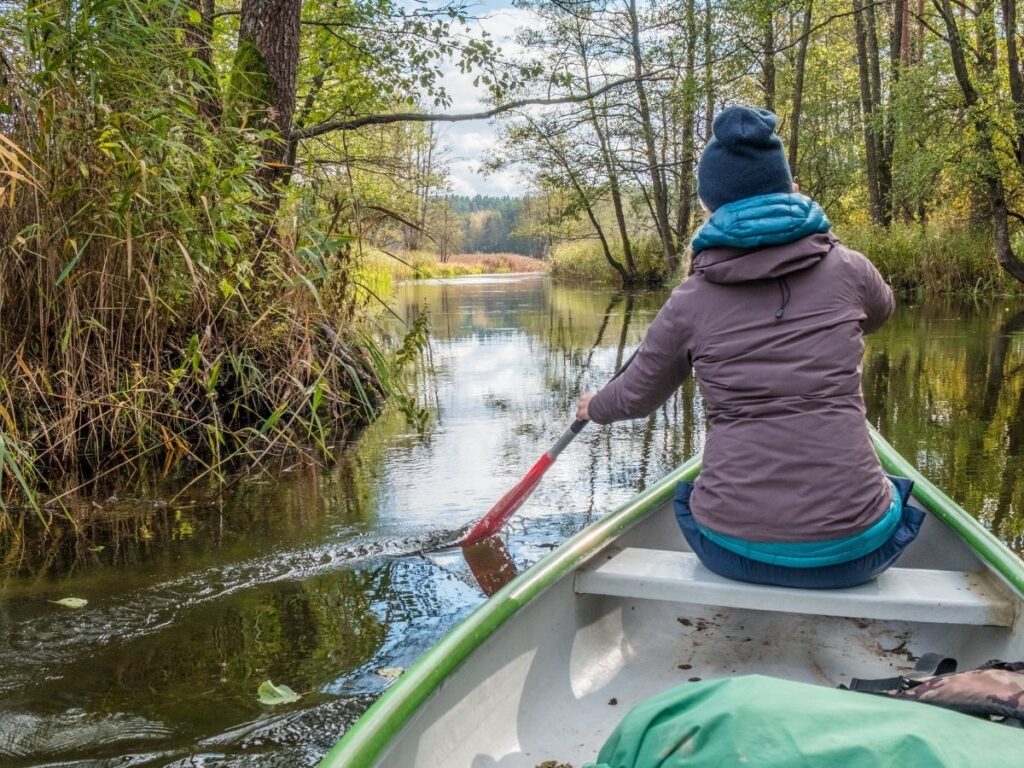
What kind of food should I pack?
According to Dalius and Egle, you should plan your food thinking how many days you plan on camping. It’s important to choose long-lasting products, and those that might expire faster, try to eat on the first day. It’s better to choose food items that are higher in calories but lower in weight, plan to make dishes that don’t require a lot of time, or buy some ready-made food that only requires adding hot water.
The couple usually brings these basic products to their camping trips: nuts, porridge, pasta, canned food, dried meat, and hard cheese. Instead of butter or oil for cooking, they choose a small pack of ghee because it holds better. If you need some camping food ideas, the travelers suggest pasta mixed with canned tuna and sun-dried tomatoes – a very simple, filling, and delicious dish!
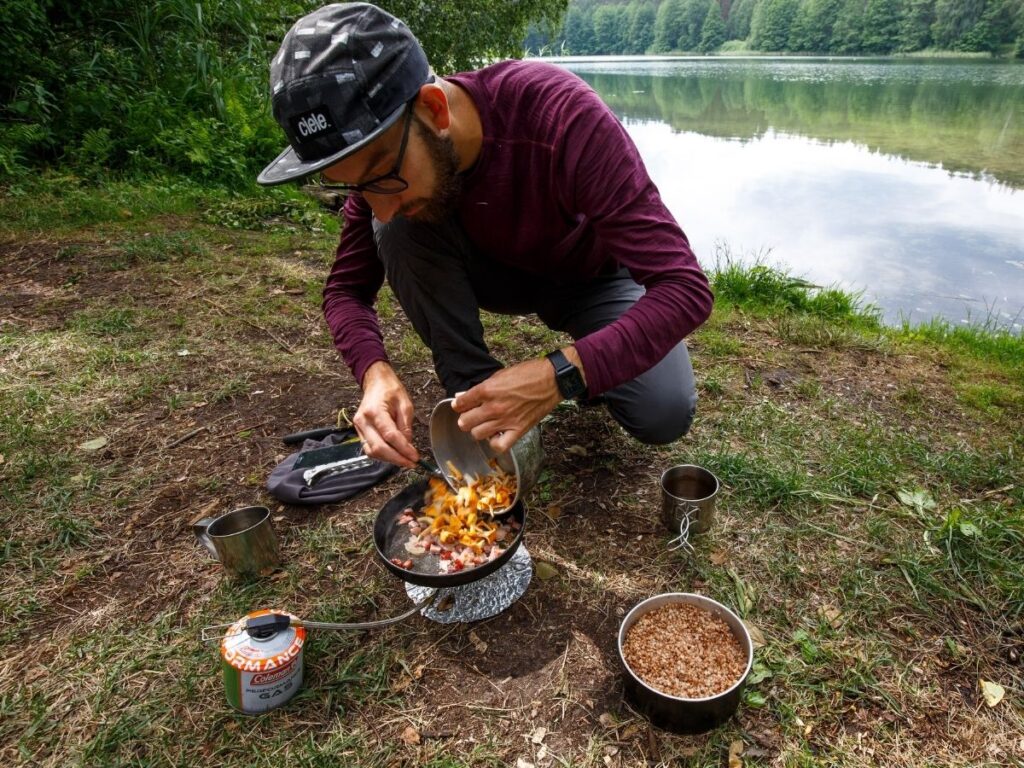
First time camping in the winter: what should I prepare?
A lot of first-time campers might raise the question if camping in the winter is even possible. Dalius and Egle are all for it: “Spending time outdoors in the winter is definitely possible, so is camping. Cold season takes a lot of our year – so why not use it?”.
According to the couple, you need to take into consideration that hiking and overall moving will keep you warm even in the cold climate, so you don’t have to add too many layers to yourself. However, in the evening, and when you stop for camping, you’ll need to find an additional heat source (usually a fire will help).
Another important thing to remember is that in the winter, the sun goes down earlier so you need to prepare for the night when there’s still light, collect some wood for the fire, build a tent, etc. For the night, you should also choose a proper sleeping bag and take more warm clothes than usual.
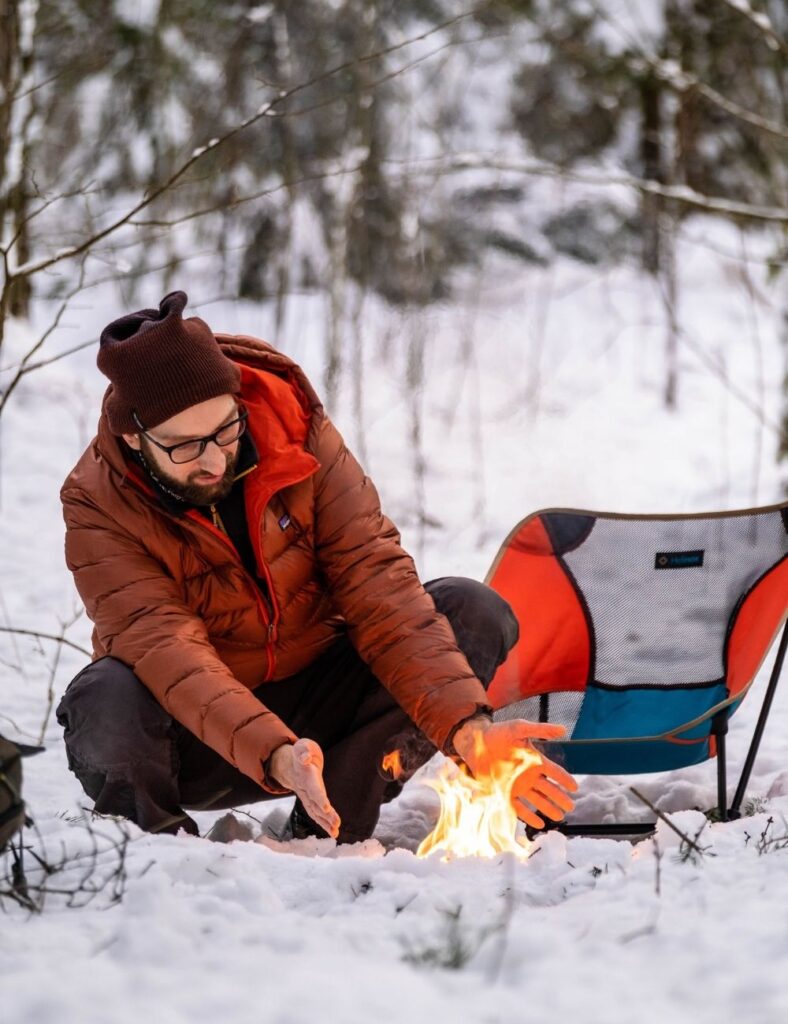
Sustainable camping: main things you need to know
When camping and spending time outdoors, you shouldn’t forget that nature is extremely sensitive to human impact: always act responsibly and leave the environment in the same condition you found it. Probably all of us know that at least collecting one’s garbage is a must. But what are some of the other sustainable camping rules we need to follow?
Garbage
When camping, most garbage comes from food leftovers, packaging, cans, and plastic bottles. That’s why Dalius and Egle recommend reviewing all the items you want to take with you already at home and rearranging everything so that you wouldn’t bring unnecessary packaging to nature. For example, you can get rid of unnecessary plastics, put your products into reusable bags, take reusable dishes and cutlery, and only the amount of food you’ll be able to consume during the trip.
Always remember to collect all of your waste after spending time outdoors. Garbage bins won’t be always available in nature, so don’t forget to take some garbage bags with you. Leaving waste in the fireplaces is also not a good idea – other campers won’t be happy with such a “surprise”, and not all garbage can be easily burnt.
Lighting fires
You should only light fires in designated places. According to Dalius and Egle, it is also important to take weather conditions into consideration:
“If the climate is hot and dry, lighting a bonfire might be dangerous. In such cases, it might be better to cook your food on a stove, and be very careful.”
For the bonfire, you can find some dry wood in the nature around you, or bring some firewood with you in the car if it’s possible. Just never start cutting trees or otherwise harming the environment!
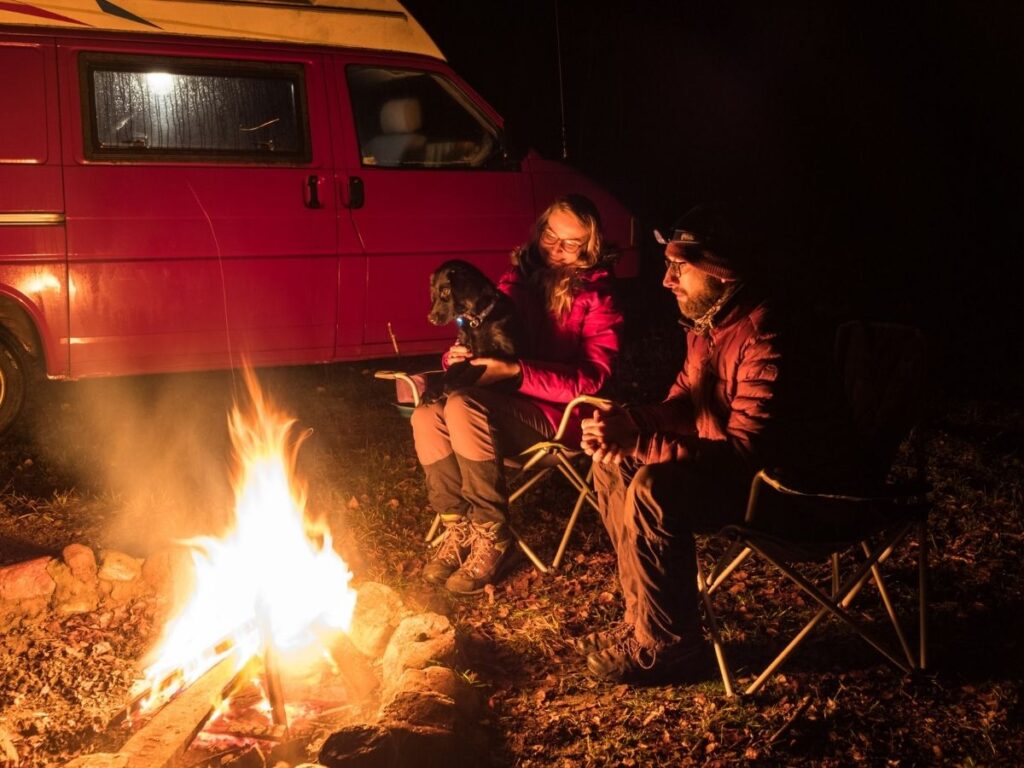
Dishwashing and personal hygiene
One of the best sustainable camping tips is to not wash your dishes or yourself in the lakes and rivers, especially using regular soaps and shampoos. You can always get environment-friendly, biodegradable soaps in the specialized shops – but even then you should only use them further away from natural water sources.
Going to the toilet
Going to the toilet outdoors is a less-discussed topic that is nevertheless relevant to every camper. When asked about it, Dalius and Egle suggest following one simple rule, known as “leave no trace”.
“No one wants to walk around in a forest covered with pieces of paper, so when nature is calling, the main rule is to walk at least 50 meters from the water sources and hiking trails, dig a 15-20 cm-deep hole (you can use a scoop for that), and after doing your business, cover it back.“
– the travelers explain.
By following this rule, you won’t leave any unpleasant imprint for other campers, and nature will eventually do its job, decomposing the organic matter.
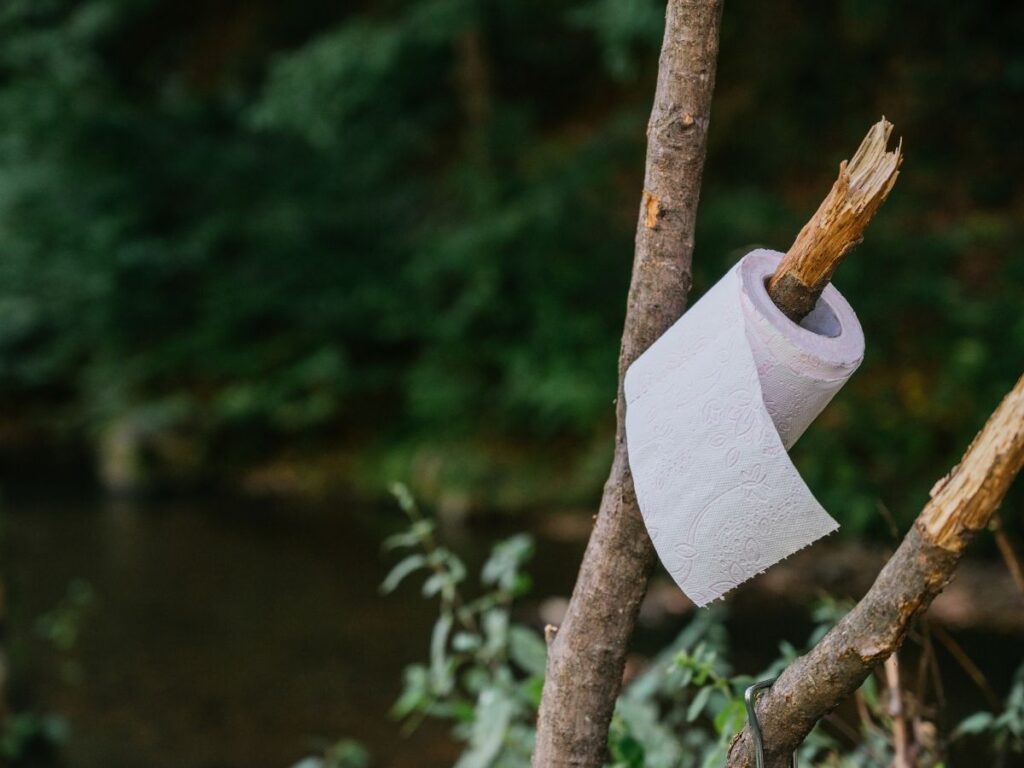

Akvilė
Pin Places You’ve Visited
-
 Push Pin World Map – Colorful (Detailed)€159.00 – €299.00
Push Pin World Map – Colorful (Detailed)€159.00 – €299.00 -
 Push Pin World Map – Safari (Detailed)€159.00 – €299.00
Push Pin World Map – Safari (Detailed)€159.00 – €299.00 -
 Push Pin World Map – Vintage light blue / brown (Detailed)€159.00 – €299.00
Push Pin World Map – Vintage light blue / brown (Detailed)€159.00 – €299.00 -
 Push Pin World Map – Grey (Detailed)€159.00 – €299.00
Push Pin World Map – Grey (Detailed)€159.00 – €299.00 -
 Push Pin World Map – Retro light blue (Detailed)€159.00 – €299.00
Push Pin World Map – Retro light blue (Detailed)€159.00 – €299.00 -
 Push Pin World Map – Midnight Black (Detailed)€159.00 – €299.00
Push Pin World Map – Midnight Black (Detailed)€159.00 – €299.00 -
 Push Pin World Map – Dark Blue (Detailed)€159.00 – €299.00
Push Pin World Map – Dark Blue (Detailed)€159.00 – €299.00 -
 Push Pin World Map – Desert Sand (Detailed)€159.00 – €299.00
Push Pin World Map – Desert Sand (Detailed)€159.00 – €299.00 -
 Push Pin World Map – Ocean Blue (Detailed)€159.00 – €299.00
Push Pin World Map – Ocean Blue (Detailed)€159.00 – €299.00
